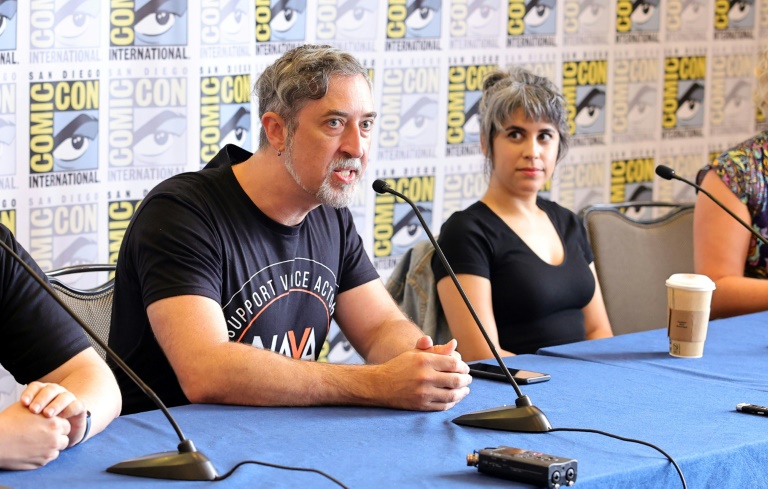“Pandora’s Box is open” when it comes to artificial intelligence, voice actors behind some of the world’s most popular animations and video games warned at this week’s Comic-Con event.
North America’s largest pop culture gathering is taking place during a major Hollywood strike, partly driven by actors and writers’ concerns about the encroachment of AI into art.
Voice actors are on the frontlines of the debate, with technology now readily available allowing users to clone somebody’s voice and have it read new dialogue — often without their permission or payment.
Tim Friedlander, founder of the National Association of Voice Actors, shared a recent example of a voice actor who had worked for a company for three years, but abruptly lost their work.
“They said ‘we have three years of your voice — we’re just going to create an AI synthetic voice out what we already have,'” Friedlander told press ahead of Saturday’s panel.
The danger does not just come from studios. The last few years have seen a sharp rise in fans using AI “deepfake mods” to clone famous voices and have them read new material, often pornographic in nature.
“I have children. There are things I don’t want my voice to say and have my children hear and question if that is something that I have actually said,” said Cissy Jones, of animated TV series “The Owl House.”
Zeke Alton, whose voice recently appeared in video game “The Calisto Protocol,” said voice actors were not trying to ban AI altogether.
“Let’s be clear — Pandora’s box is open,” he said.
“If you’re going to replicate me or any other performer, we should consent to that, and then we should be compensated for the use of what makes us money.”
– ‘Digital replica’ –
Artificial intelligence is a key sticking point in stalled talks between Hollywood studios and the Screen Actors Guild (SAG-AFTRA), which this month joined writers on strike.
Actors have accused studios of failing to take seriously concerns that would leave them “vulnerable to having most of their work replaced by digital replicas.”
The studios said Friday they had offered to establish informed consent and fair compensation when a “digital replica” is made of a performer or their voice, and that the union did not respond.
Duncan Crabtree-Ireland, chief negotiator for SAG-AFTRA, told journalists at Comic-Con that studios want to “bury” AI consent clauses “in some sentence in the middle of a 12-page contract.”
Voice actors are “at the forefront” of the AI debate, he warned, with changes “happening more quickly with voice acting than it is in any other field.”
For instance, studios are exploring AI to dub dialogue into foreign languages, which would strip voice actors around the world of valuable work for their local markets.
Another concern is that studios could use “synthesized” voices that merge multiple human voices, and not pay any of the original actors.
– ‘Not protected’ –
Despite the furor, not all voice acting work is currently affected by the strike, as some is negotiated under separate union contracts.
Voicing characters in animation, announcing trailers or adding dialogue for background actors in film or television scenes — a very common practice known as “looping” or ADR (Automated Dialogue Replacement) — is banned.
But voicework for video games comes under a separate union contract for “interactive” media, for which talks are still ongoing, and therefore can still be performed without breaking the strike.
Still, Alton warned, “what happens in this strike is going to impact not only the acting profession, but every profession.”
“An actor is an actor is an actor. So if we are not protected at the end of this strike in this contract, we’re not protected in any contract.”

 Business4 months ago
Business4 months ago
 Business5 months ago
Business5 months ago
 Events3 months ago
Events3 months ago
 People4 months ago
People4 months ago
 Events6 months ago
Events6 months ago
















